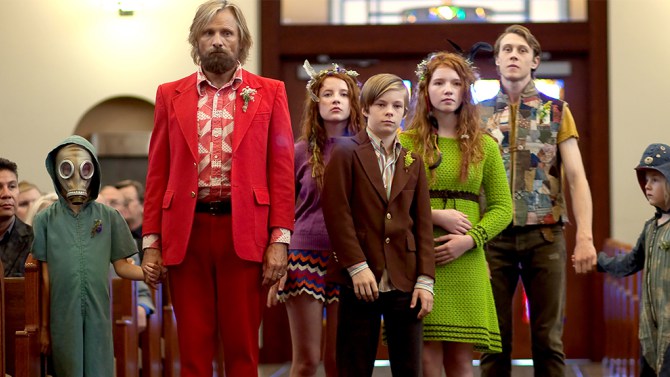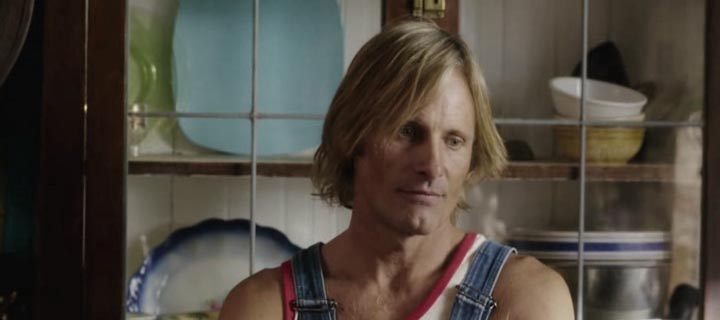A film punctuated with moments of insight assembled into an absurdly non-sensical montage, when looked at properly, reflects something about the insanity of American social-life while remaining a film absolutely not worth taking very seriously.xxxxxxxxxxxxxxxxxxxxxxxxxxxxxxxxxxxxxxxxxxxxxxxxxxxxxxxxxxxxxxxxxxxxxxxxxxxxxxxxxxxxxxxxxxxxxxxxxxxxxxxxxxxxxxxxxxxxxxxxxxxxxxxxxxxxxxxxxxxxxxxxxxxxxxxxxxxxxxxxxxxxxxxxxxxxxxxxxxxxxxxxxxxxxxxxxxxxxxxxxxxxxxxxxxxxxxxxxxxxxxxxxxxxxxxxxxxxxxxxxxxxxxxxxxxxxxxxxxxxxxxxxxxxxxxxxxxxxxxxxxxxxxxxxxxxxxxxxxxx
The way Captain Fantastic ends is interesting. It's almost like the film has ended, although the camera continues to roll, and what we see is a group of people awkwardly continuing to act as if the movie has not yet, in fact, ended.
The scene is like a documentary of the making of a movie, but one that is here simply part of the movie itself. It's very strange, and it seems like the viewer isn't the only one confused, as the Captain himself (Viggo Mortensen), after some long moments of the silent, awkward sound of eating breakfast, lets out a long sigh, and the director finally gets the hint to cue the end-sequence music and roll credits.
If Deleuze was correct that the most essential aspect conveyed by film, at every moment the most basic logic that binds its montage of images together is one concerning money, then this scene surely contradicts that thesis. And its fitting as well, because the entire contrived premise of the film is predicated on the absurd assumption that every indulgence that takes place in it can be paid for. A family gone 'off the grid' in the forests of Alaska for 10-years, driving into town to buy needed supplies, owning a bus with enough money to drive the gas guzzling rig all the way south through Canada to New Mexico for a funeral that must have cost thousands, an entire misadventure that culminates with the family reunited for breakfast, sitting around what looks to be a quite nice (and expensive) piece of real-estate somewhere in the Northwest United States, not long after sending a son off on an expensive plane fare to Namibia. All without having done a days work (that we see, besides bringing some jars and ragged produce to town for barter). Money, in this film, is simply not a concern, at any point: not in the film itself, and not for the film itself. If there was any doubt throughout the film about what its implied assumptions were, then the end sequence above tells all there is to know about it. Run the camera until the batteries run out, put it on a storage device and ship it out to the cinema with some Bob Dylan cover music at the end, cost is not a concern.
This isn't to say that the film is all bad. It's not. It's a likable film, with its heart in the vicinity of the right place, one made in the likeness of films like Juno or Little Miss Sunshine, one of these films that fits the mold of what are now called 'independent' films: glossy, fun, easy to watch films that have some kernel of seriousness about them. In this grain, the film makes several surprisingly insightful comments on contemporary (American) consumer culture. The scene, for instance, as they drive their rig to the funeral and are discussing what to eat and the Captain says, basically: 'listen guys, we're not eating in a restaurant or going shopping just so we can participate in social life in the only way that is possible in today's consumer culture'. This idea (i.e., the Cheers notion that to have friends one must spend money in a bar) is incredibly insightful, and the film doles out the insight in a casual way, its profundity almost imperceptible. Then there's the scene where the 'family' visits the Captain's sister and they all sit together around the dinner table trying to discuss/overlook the death in the family: the sister's husband speaks in euphemisms about it to 'protect his children', but the Captain just lays it all out there in a refreshing way, raw and unsettling. The Captain's kids can take it, in fact they are proven to be much more aware, even hyper-aware of themselves and surroundings, while the sheltered children of the sister just sloth around playing video games or stare into their mobile phones: they have little seriousness about them, and the film captures the interplay between these mostly constructed personalities and the kind of awkward-yet-edgey confrontation between their personal, private philosophies in just about the right way. Because its never a simple case that one argues rationally the merits of their philosophy, but, rather, the case that such argumentation is also always presumptuous, judgmental and arrogant and leads to awkward character-attack based conflicts1.
Unfortunately, however, these moments of insight are assembled into a montage of scenes organized around a premise that makes basically no sense at all. The Captain's wife has died, but his dead wife's father doesn't want him or their three grandchildren anywhere in sight. In fact, he'll call the police if they arrive at the funeral. And so the whole family then suddenly has the absurd existential dread of the Captain 'losing custody' of his children. And fair enough, when the toad of a grandfather makes his appearance to tear the family apart for his own invented reasons ('look at your beard, you're not a serious person to raise my grandchildren'), its clear why: he's a completely nonsensical straw-man construct. More specifically, he's a caricature of what a fascist dictator might really be, at least, a caricature of what any 'normal', decent, rational fascist dictator would be. Like with the intolerable Bloodline, portraying the reality of American life is not strictly possible in a traditional, logical, representational way. People's behavior in our culture has become so utterly incomprehensible within the context of a totally atomized society that models all its behavior on books and movies and the philosophies contained in them that the non-sensicality of contrived characters and meaningless, absurd social interaction is, in fact, the only way to properly represent it faithfully on screen. Which is a real contradiction, as its barely watchable as a result. However, on the other hand, if one is actually interested in the reality of American culture, a fabricated tyrant like the grandfather of this film and the pasted-together collage of people and places, punctuated with profound insight and depth of meaning is what you'll need to endure to properly perceive it.
So, when the son gets on a plane to fly to Namibia, don't scoff. When the family stands around in some uncharted nowhere wilderness, free from park rangers and police with the stolen body of their mother and wife and burn her on an enormous funeral pyre at dusk while singing an overly performative and absolutely irritating rendition of the Guns and Roses song 'Sweet Child of Mine', keep watching. And don't look away for a second when, one minute, the Captain has left his children behind with his father so he can raise them, has driven off alone into the New Mexico desert, stopped at a gas station along some isolated highway to shave his beard in the strange light of the bathroom to reinvent himself, and in the next instant, exiting dejectedly from the bathroom, his children pile down the bus steps to greet him and they carry on as if the entire middle section of the film never even happened and they weren't left behind with their grandfather. Yes, it makes no sense at all. But it also makes complete sense. That is American life, through and through, to its core: nonsensical conflict and nonsensical resolution.
In concluding, and coming back to the silent, awkward ending scene, its clear that the director, Matt Ross, himself fancies that he's made a real intervention into the American cultural-philosophical space, that he's carved out a new perspective, one that blends the virtues of the radical American individual with a respect for society and the sorts of knowledge and experience only achievable amongst others. Its a film he feels he can end in an 'artistic' way, one that wants to inscribe itself into the history of cinema as a political art-form2. But the truth is that one can't just invent a Chomsky day, hand out Bowie-knives and porno magazines to children, contrive a life of impossible self-sufficiency in the wilderness while ignoring the hard-reality of the kind of money needed to make all these things possible and the reasons why such a life is so totally out of the realm of reality for almost all people who aren't movie directors with bundles of money3. The struggle for such a life isn't pure concept; it is struggle against structured social, economic and political forces. Its fine to overlook such things for the sake of making a film: the frame of any film is based on exclusion. However, in the case of this film, while the contrivances used do arrive at a worthwhile perspective on the limits of individualism (just like the conclusion of Into the Wild), the fact that it gets there through the casual mishandling of so many valuable ideas that do actually form the basis for a radical politics and counter-cultural movement should make one think twice about giving this film any position of authority over these ideas. It is a very easy and small misstep from serious social and political critique to appropriation and redirection towards the impotent desert of pop-cultural chatter and disingenuous market-oriented 'philosophies'. And on that point, its enough to contemplate the fate of so many of the 1960's counter-cultural radicals who today make a living selling self-help therapies and friendship from the comfort and confine of their sequestered, alienated lives.
So, the film gets some things right, has some insight, assembles it into a nonsensical montage of idiocy that, if one looks at it properly, just happens to accurately reflect an American culture gone meaningless; but, taken seriously, as the film seems to take itself, its not really worth all that much. In fact, its just exploiting the mold carved out by so-called 'independent' films, trying to be something it isn't through cultural appropriation. Which is precisely the logic of the genre. In short, the film is a lot like the photo used in its promotional material:

Footnotes
For instance, in America, to challenge another's choices in 'their house' is simply off-limits. It is the final moment in any argument to let another person know that their philosophy actually has physical limits and that any further pursuit of the discussion will enter the realm of personality conflict and a conflict that dredges through history to 'settle scores'. So, philosophy becomes, then, personality-based. ↩
Considering the 'artistic' merit of the ending, we might say it makes the point that, in the end, all that is film and cinematic has ended, the trial the family has gone through to live a life according to a contrived, invented philosophy that mirrors the film's representation of it, has come to an end and we are left watching what appears to finally be a real life. ↩
It's also worth considering the significance of the fact that the director of this film, Matt Ross, plays the character Gavin Belson in the HBO series Silicon Valley, the absurd CEO and series' 'villain' of the Microsoft-like mega-company Hoolie who, like his contemporaries in that tech-culture, see themselves not only as entrepreneurs and inventors, as simple creators of technology, but also as revolutionaries on a divine spiritual mission to transform the world. A case study in the cinematic: that one man's screen persona and identity should inform his real-world pursuits and the philosophy he would then transmit through his work. Where does the fiction end and the reality begin? ↩
